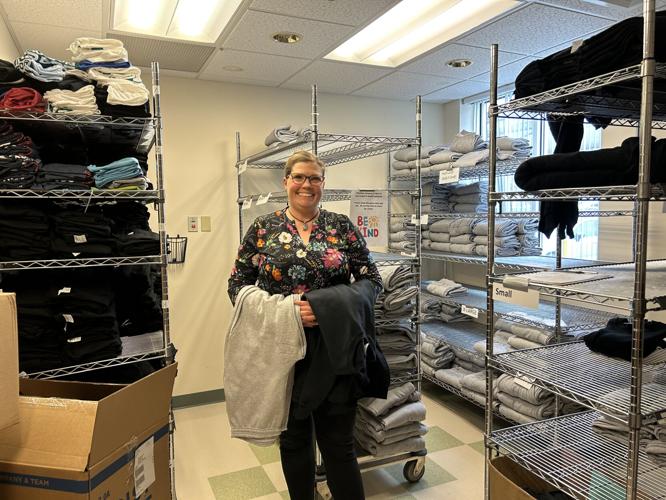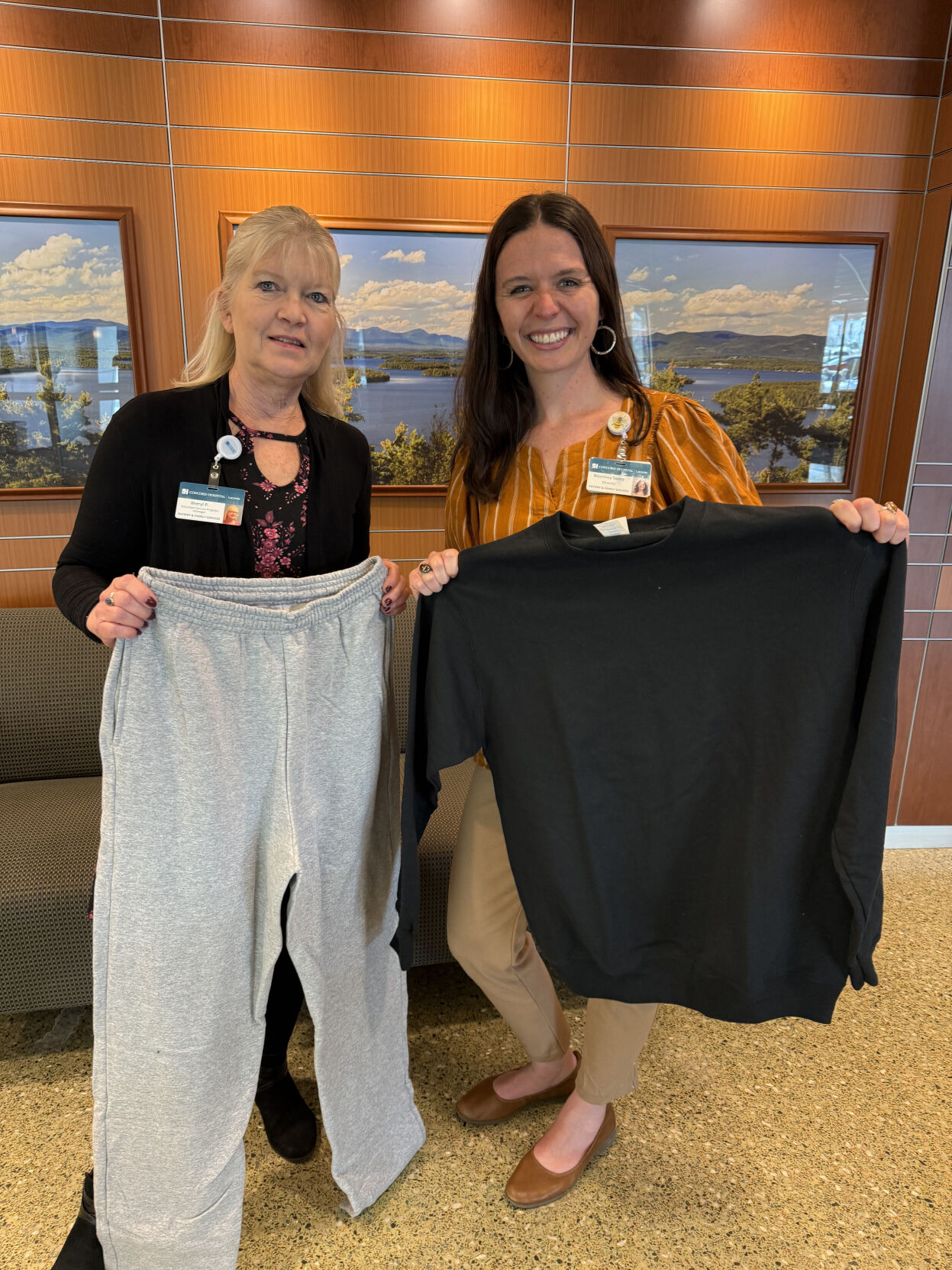Concord Hospital is known for many things — providing care to the injured and sick, supporting local and regional health care efforts, and now, affording clothes to those who don’t have any.
The CHomfort Closet, pronounced “comfort”, is a program at all three campuses of Concord Hospital which serves to identify patients in need of warm, clean clothing while being discharged after receiving treatment.
In hospitals across the country, patients involved in serious health care incidents or find themselves in need of emergency care may be discharged from the hospital wearing scrubs or thin gowns. That was the case at Concord Hospital, too, up until a few years ago, when a group of individuals decided to do something about it.
Rev. Kate Morse, chaplain at the Concord campus, and Jessica Bailey, program manager for volunteers in Concord, on two occasions found themselves outside the hospital and noticed patients being discharged wearing hospital gowns or scrubs. That didn’t sit right with them.
One woman was waiting for a ride to a rehabilitation facility following her discharge from Concord, sitting in a wheelchair and wearing two hospital gowns, one to cover her front and another to cover her rear.
“While she was fully covered, I remember thinking to myself, ‘That’s not OK, that’s not right,'” Morse said in an interview.
She spotted another man on a different occasion wearing hospital scrubs and hailing a taxi.
“While they’re important and functional in a hospital setting, they’re not meant to be worn in public. And I was concerned for him,” she said.
So Morse and Bailey put their heads together and came up with what would become the CHomfort Closet. Having received their first round of funding, the program launched in October 2022, in Concord, and has since grown to all three campuses.
Initially, program leadership solicited donations of clothing, but learned after a short period that method wouldn’t cut it. Donations were appreciated, but were at times inappropriate, so they decided to find a source of funding to be able to procure the right sort of clothing to fit the needs of the program.
They submitted a funding request to The Women’s Giving Circle, associated with the Concord Hospital Trust, for $2,000. They received those funds, which they thought would support the program for at least an entire year. But the need far surpassed their expectations.
“The need was definitely higher than we anticipated,” Bailey said.
They ordered sweatpants and sweatshirts — now they purchase T-shirts, too — and received a donation of tees leftover from hospital events. That did the trick for a while, but soon organizers submitted a request to the hospital’s community service fund for $25,000, expecting to receive at most a portion of those funds.
In February 2023, they received all $25,000.
“They were so impressed with the program that they fully funded us the $25,000,” Bailey said.
They soon found themselves in need of more money. The closet purchases clothing from Speedy Printing of Concord, which produces the clothing at their own cost, not making a dime of profit from the relationship with the hospital. That arrangement allows the program to procure far more clothing than they likely would otherwise.
For the closet, organizers purchase unisex clothing ranging in size from extra small to 6XL, hoping to have something for almost anybody in need. They tend to run out of clothing in the most common sizes much more quickly, and again found themselves in need of making a purchase. The Women’s Giving Circle funded them again to the tune of $5,000 in June 2024.
And on Tuesday, hospital spokesperson Dawn Beers said the program received an additional $2,500 in grant funding from the Bishop's Charitable Assistance Fund associated with the Diocese of Manchester.
“We are incredibly fortunate to have very strong support from all three hospital campuses,” Morse said, noting the program grows on a regular basis.
People may been in need of clothing upon discharge in numerous ways, Morse and Bailey explained. In one instance, a man was involved in a serious car accident, his clothes muddied and vehicle totaled. He received emergency care at the hospital, and doctors had to cut his clothes off his body. Because his car was totaled, and he and his spouse lived miles from the hospital, he wasn’t able to get a change of clothing before discharge. CHomfort Closet set him straight with warm clothes before he left the property.
In another example, an elderly and fiercely independent woman, still living in her own home, fell in the middle of the night. She alerted EMS and arrived at the hospital donning a nightgown which, for one reason or another, she could no longer wear warm. Her family was in contact with her, and traveling from out of state to support her, but she left the hospital for a rehabilitation facility wearing CHomfort Closet clothing.
“The need for CHomfort Closet has bloomed,” Morse said.
Morse remembers another instance, when a man experiencing homelessness arrived at the hospital and his clothing was infested with bedbugs. He, too, left the hospital wearing clothing provided for by the closet.
Patients being discharged without proper clothes isn’t just a Concord Hospital problem, “it’s a health care problem,” Morse said.
And it’s not just for those in typical situations. Nurses and providers have leeway to identify patients who would benefit from the program.
“Any one of us, myself included, could find themselves in a situation where they’re unexpectedly hospitalized, and for any number of reasons don’t have access to their own clothing,” Morse said. “This is for anyone and everyone and we really see this — having clothes upon discharge — is a basic human right. It’s about dignity and respect.”
A man in his 80s, suffering from severe dementia, was in the hospital for treatment. Staff noticed he was visibly agitated, picking at the hospital gown he was wearing. His nurse explained to CHomfort Closet that although his case wasn’t the typical purpose of the program, she thought having traditional clothing may benefit him.
“That would just feel a little more normal,” Morse said. “I would like to tell you it took away all of his anxiety — it didn’t, but it did lessen his anxiety. Even lessened anxiety is a win in those situations,” Morse said.
The program operates on each of the hospital's campuses — there are totes full of clothes on hospital floors, and providers have access to the main storage space for odd-hours when patients may still be in need.
“Concord has the home base of supplies and the similar method of bins that are located on each patient unit,” Kourtney Soucy, director of patient and family services said. “The home base is in Concord, and then we distribute to Laconia and Franklin.”
Anyone interested in supporting the program can do so by going to giveto.concordhospital.org, and making a monetary donation. Be sure to denote the purpose is to support the CHomfort Closet.
Soucy said the program has been lucky to receive immense community-based support.
“It’s all community groups that are donating to this program,” Soucy said. “All of these funding sources are coming from the community and individuals that are directly related to the hospital and the community itself.”



















(0) comments
Welcome to the discussion.
Log In
Keep it Clean. Please avoid obscene, vulgar, lewd, racist or sexually-oriented language.
PLEASE TURN OFF YOUR CAPS LOCK.
Don't Threaten. Threats of harming another person will not be tolerated.
Be Truthful. Don't knowingly lie about anyone or anything.
Be Nice. No racism, sexism or any sort of -ism that is degrading to another person.
Be Proactive. Use the 'Report' link on each comment to let us know of abusive posts.
Share with Us. We'd love to hear eyewitness accounts, the history behind an article.